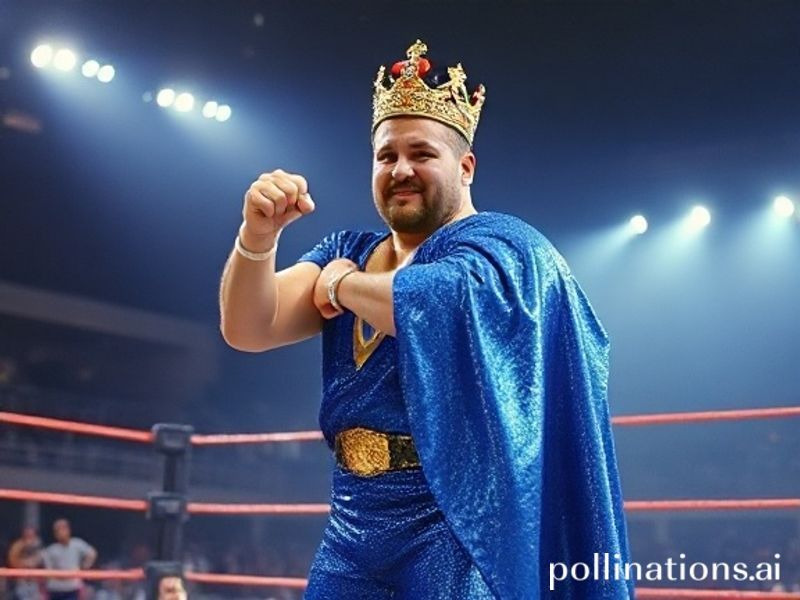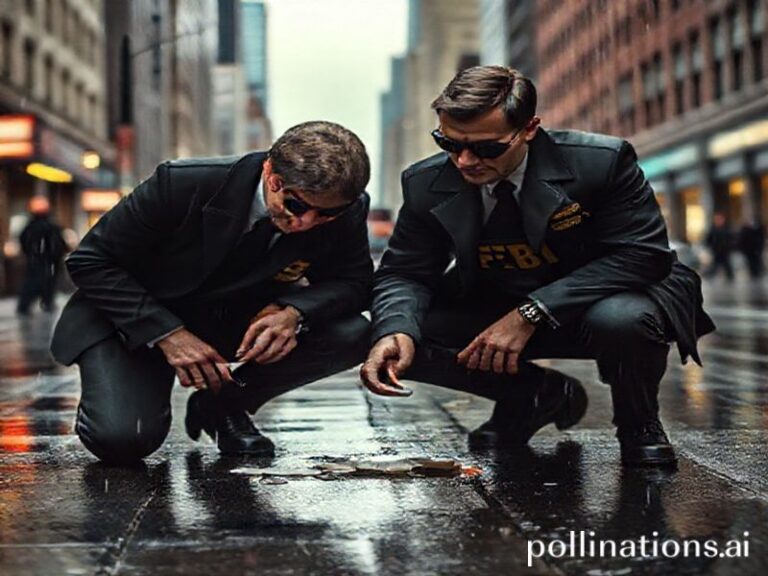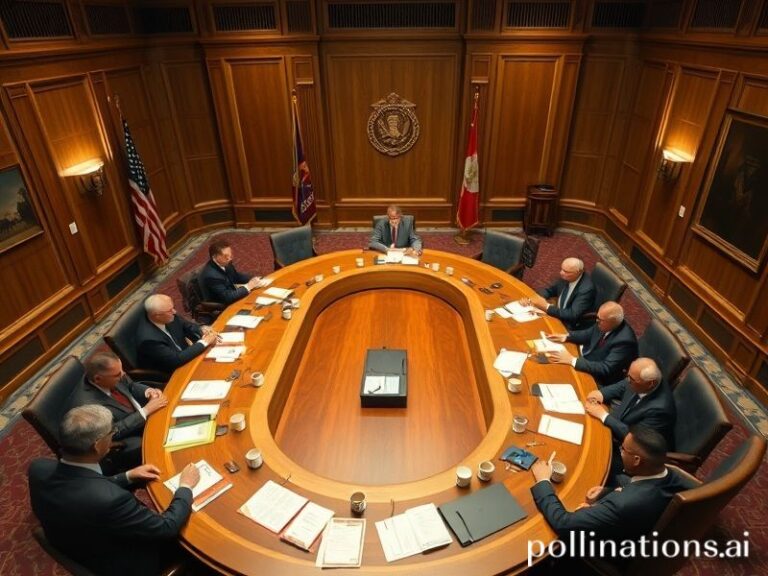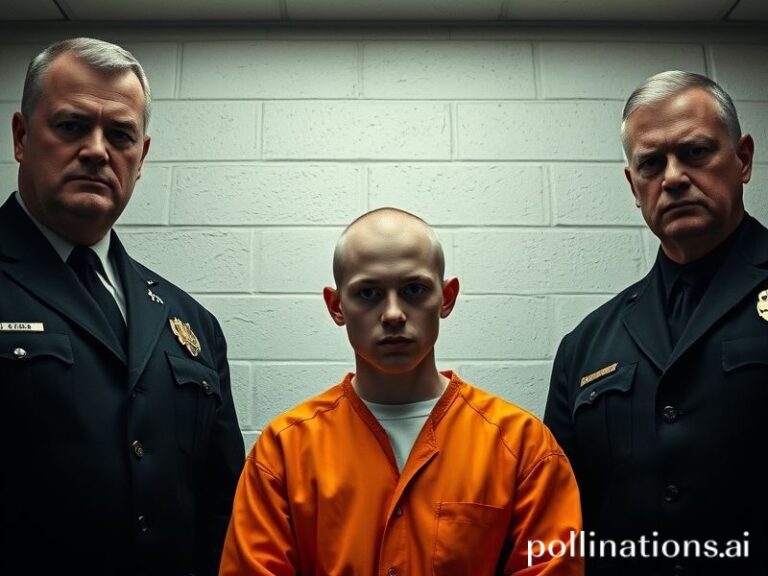How Jerry Lawler Crowned the World: Wrestling’s Last Universal Joke and the Geopolitics of Kayfabe
The Global Court Jester: How Jerry “The King” Lawler Became Wrestling’s Last Universal Punchline
By Dave’s Foreign Desk
Cairo, 3:14 a.m. local time—while the Nile glugs past like a bored bartender, a taxi driver in a faded Undertaker T-shirt is replaying on his cracked phone the 1982 bout in which Jerry Lawler pile-drove comedian Andy Kaufman straight into Memphis myth. Somewhere in São Paulo an investment banker in a $2,000 suit is pulling up the same clip to impress his teenage nephew. In Seoul, a BTS fan edits Lawler’s crown-and-cape entrance into a TikTok about monarchy, masculinity, and late-capitalist camp. The joke, of course, is that none of them realize they’re participating in the last functioning global monoculture: the shared understanding that an American carny in sequins once convinced the planet that fake pain could feel more honest than most real news.
From a purely geopolitical view, Lawler is the rare export the United States never had to invade anyone to promote. While Hollywood spent billions trying to democratize popcorn and the State Department bankrolled jazz tours to outflank the Soviets, Lawler simply climbed a turnbuckle in Tennessee and let regional cable do the rest. The Berlin Wall came down; Lawler’s crown stayed up. The Soviet Union dissolved; Lawler’s catchphrases (“puppies!”) endured in dorm rooms from Vladivostok to Valparaíso. Historians will argue whether NATO expansion or the Monday Night Wars did more to shape the 1990s, but only one of them gave us Stone Cold Steve Austin suplexing Vince McMahon while Lawler cackled in Aramaic levels of hysteria.
What makes Lawler internationally fascinating is that he embodies the pure, uncut essence of kayfabe—the carnivalesque contract where everyone pretends not to know they’re pretending. In an era when every government lies on main and then live-tweets the evidence, Lawler’s old-school insistence that the blood is real (it was usually a discreet razorblade) feels almost quaint, like a telegram from a politer apocalypse. The planet’s current disinformation glut is just kayfabe without the tights: scripted villains, manufactured outrage, pay-per-view grudges. Lawler at least had the decency to sell popcorn while he worked the marks.
Economists could build a model on him. The King’s merchandising reach stretches from Filipino street stalls hawking knock-off crown foam to Etsy artisans in the Netherlands hand-stitching ironic cross-stitch samplers reading “Puppies!” in Gothic font. His image—snarling, crowned, pointing at imaginary breasts—has become a sort of post-ironic hieroglyph, instantly legible whether you grew up on Telemundo or NHK. There’s a hedge fund in London that reportedly uses vintage Lawler action-figure sales on eBay as a contrarian indicator for American consumer confidence. When the King rises, the dollar falls, or so the theory goes. (Correlation is not causation, but tell that to the guy shorting the greenback every time a MOC* unpunched Lawler hits a million Yen.)
And then there is the matter of mortality, that universal heel no promoter can kayfabe forever. In 2012 Lawler literally died on live television in Montreal—cardiac arrest mid-match—only to be revived by a pair of bilingual paramedics who probably grew up imitating his promos in backyard rings. The footage is geo-blocked in several countries for being “too on the nose,” as if the universe itself were flirting with self-parody. When he returned three months later, the crowd reaction was so loud it registered on a seismograph in Ottawa. Scientists filed it under “anthropogenic joyquake,” a phrase that sounds like a Lawler promo translated into academese.
Now 74, the King still makes cameos, selling nostalgia the way McDonald’s sells fries: hot, salty, and bad for you if consumed daily. Meanwhile, the world keeps cutting promos on itself—trade wars, climate disasters, crypto crashes—each crisis more scripted than the last. Against that backdrop, Lawler’s act feels refreshingly honest: a man who admits the crown is cardboard, the blood is ketchup, the feud will be settled by the next commercial break. In other words, he gives us the one thing global politics won’t: a finish we can agree on, even if we know it’s predetermined.
And so, somewhere tonight—whether you’re sipping raki in Istanbul or bubble tea in Taipei—someone is cueing up that grainy footage of Lawler smashing a guitar over Kaufman’s head and laughing at the sheer, magnificent fraudulence of it all. The joke is on us, and we’re in on it. Long live the King; long live the joke. May we all sell it so well when our own curtains finally fall.







